"In search of lost worlds"
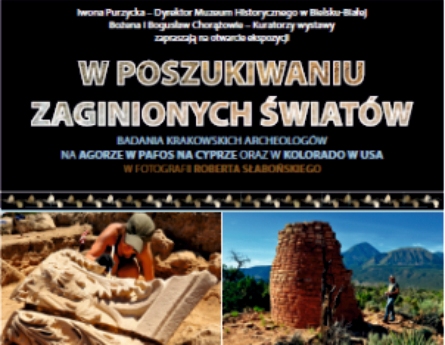
In January, the "In Search of Lost Worlds" exhibition opens at the Old Factory Museum in Bielsko Biała, presenting the results of the Jagiellonian University's excavations in Agora in Paphos, Cyprus and in Sand Canyon in Colorado, USA.
Paphos 2017 - European Capital of Culture
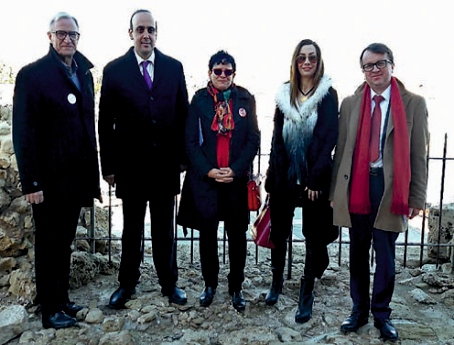
In January, at the invitation of the Mayor of Paphos, P. Phedonos, a delegation from the Jagiellonian University - Dean of the Faculty of History, prof. J. Święch, Vice-Dean of the Faculty of History, prof. S. Sroka and prof. E. Papuci-Władyka takes part in the opening ceremony of the European Capital of Culture Paphos 2017.
The exhibition "In the heart of the ancient city" travels to Poznań
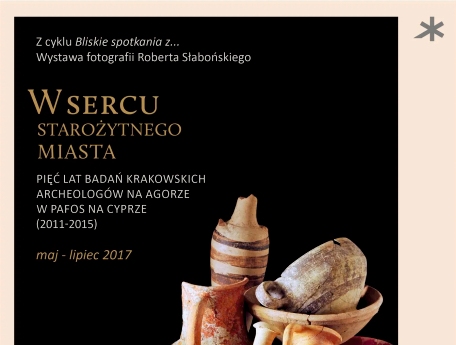
In May, the exhibition "In the heart of the ancient city" travels to the Archaeological Museum in Poznań.
Study campaign and going beyond Agora
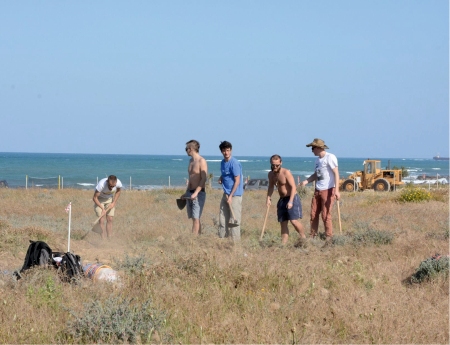
Another study campaign devoted to the development of the discovered artifacts took place in the spring. In 2017, it was combined with the first excavations outside Agora. In line with the assumptions of the Maestro grant, consisting in the search for economic infrastructure and its relationship with Agora, two Survey Excavations I and II were opened in the area of the beach north of the city, where the remains of the second port were expected.
16th Bari Expedition in Paphos
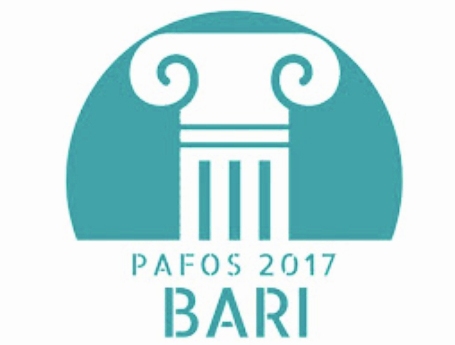
In August, Paphos is visited by the XVI BARI expedition organized by the "Dahlta" Scientific Club of Surveyors operating at the Faculty of Mining Surveying and Environmental Engineering of AGH.
7th excavation campaign
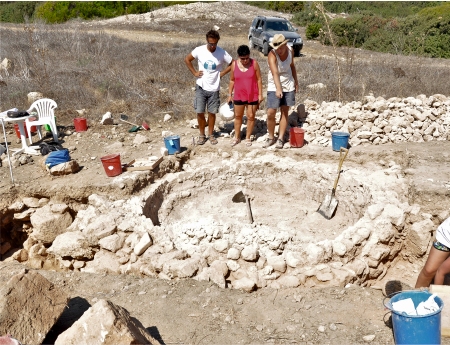 The 7th excavation campaign lasted from mid-August to early October. Work continued inside the Agora in Trench II and IV. The survey research was concentrated in the northern part of the city. Work was carried out on the Trial Trench I and II, where late Roman tombs were found. Trial Trench III was opened in the area of the so-called the moat. Thanks to the evidence from geophysical research, the IV Trial Trench was opened in the place where a lime kiln was found.
The 7th excavation campaign lasted from mid-August to early October. Work continued inside the Agora in Trench II and IV. The survey research was concentrated in the northern part of the city. Work was carried out on the Trial Trench I and II, where late Roman tombs were found. Trial Trench III was opened in the area of the so-called the moat. Thanks to the evidence from geophysical research, the IV Trial Trench was opened in the place where a lime kiln was found.
.
"In the heart of the ancient city" travels to Paphos
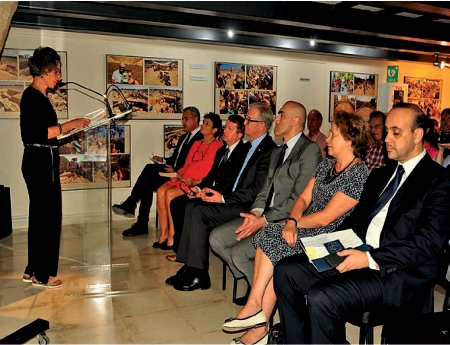
As part of the Paphos 2017 celebration, the exhibition of Robert Słaboński's photography "In the heart of the ancient city" with Hubert Chudzio's film about PAP is being opened in the Archaeological Park in Paphos. The opening ceremony was graced by the presence of the Ambassador of the Republic of Poland in Nicosia - B. Tuge -Erecińska, representative of the Ministry of Transport, Communication and Public Works of Cyprus - A. Kofterou, Ph. Phedonos - Mayor of Paphos, M. Solomidou-Ieronymidou - director of the Department of Antiquities of Cyprus and a delegation of the Jagiellonian University in the persons of the Vice-Rector of the Jagiellonian University, A. Edigarian, Dean of the Faculty of History, J. Święch and Vice-Dean of the Faculty of History, S. Sroka.
Mystery of the City of Aphrodite
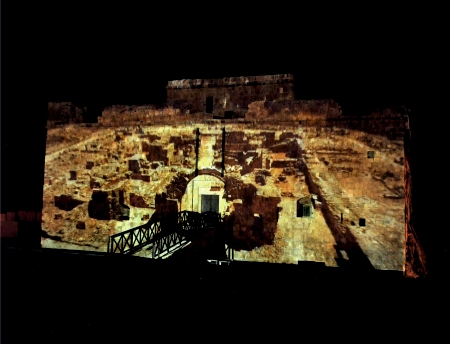
During the Paphos 2017 celebration in the port of Paphos, a multimedia performance prepared by J. Konstantinovski Puntos is performed.
You can watch report from the performence >> here
Pafos2017 Statue for the Mayor of Paphos
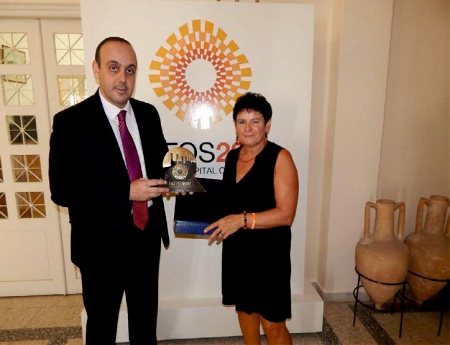
As part of the Paphos 2017 celebration, prof. E. Papuci-Władyka presents the Mayor of Paphos with Ph. Phedonos with a statuette made by E. Wójcik-Konstantinovska.
Pafos2017 statuette for the Rector of the Jagiellonian University
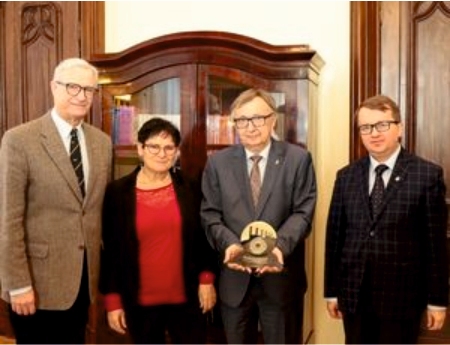 As part of the Pafos2017 celebration, prof. E. Papuci-Władyka presents the Rector of the Jagiellonian University, prof. W. Nowak a statuette made by E. Wójcik-Konstantinovska.
As part of the Pafos2017 celebration, prof. E. Papuci-Władyka presents the Rector of the Jagiellonian University, prof. W. Nowak a statuette made by E. Wójcik-Konstantinovska.
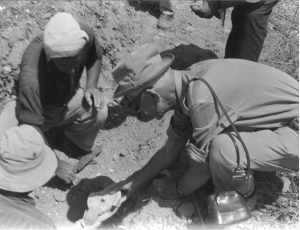
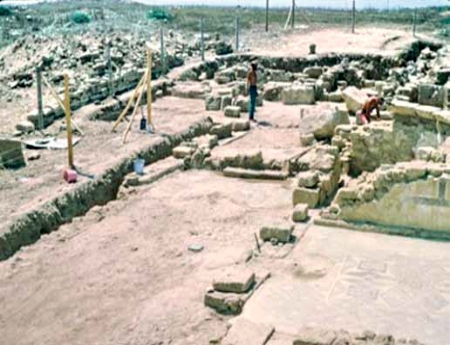
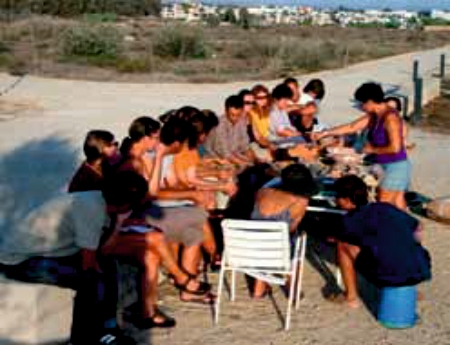
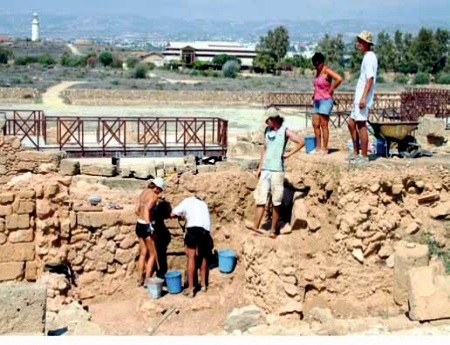


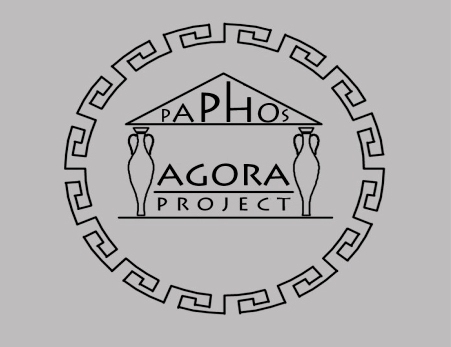
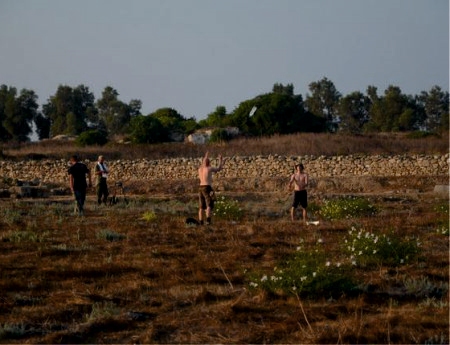 The first geophysical research with the electrofusion method on the Agora.
The first geophysical research with the electrofusion method on the Agora.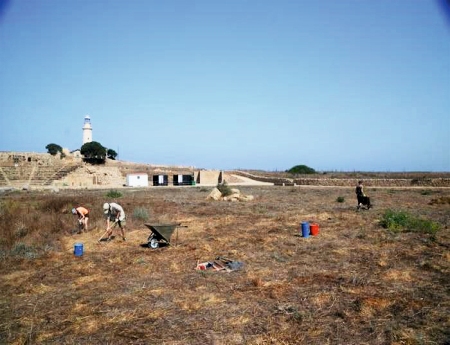 The first excavation season begins in July! Trench I in the center of Agora and Trench II in the Eastern Portico are opened.
The first excavation season begins in July! Trench I in the center of Agora and Trench II in the Eastern Portico are opened.
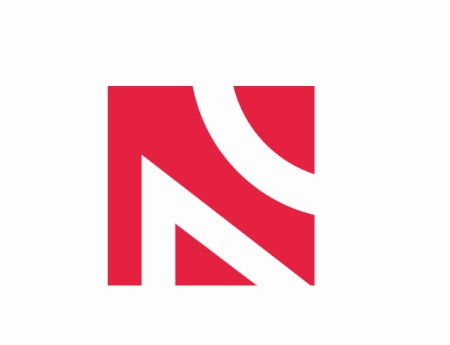 Prof. E. Papuci-Władyka receives the first research grant Opus (no. 2011/01 / B / HS 3/01282) of the National Science Center for 2011-2014 - Paphos (Cyprus) Agora of Hellenistic and Roman city. Research of the Jagiellonian University
Prof. E. Papuci-Władyka receives the first research grant Opus (no. 2011/01 / B / HS 3/01282) of the National Science Center for 2011-2014 - Paphos (Cyprus) Agora of Hellenistic and Roman city. Research of the Jagiellonian University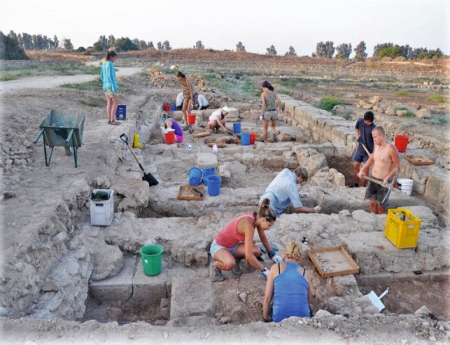 During the 2nd season of excavation works, research was continued on Trench I and Trench II, where the number of discovered rooms in the Eastern Portico of Agora exceeds 10.
During the 2nd season of excavation works, research was continued on Trench I and Trench II, where the number of discovered rooms in the Eastern Portico of Agora exceeds 10.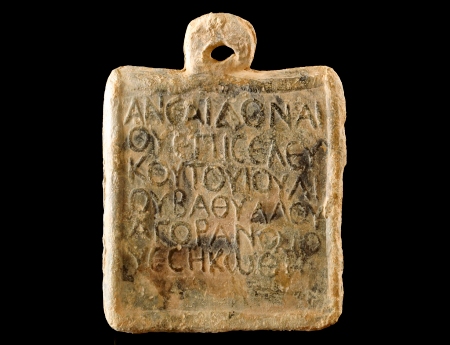 During the second excavation season, a weight was found with the inscribed name of agoranomos Seleucus, a high official managing Agora.
During the second excavation season, a weight was found with the inscribed name of agoranomos Seleucus, a high official managing Agora.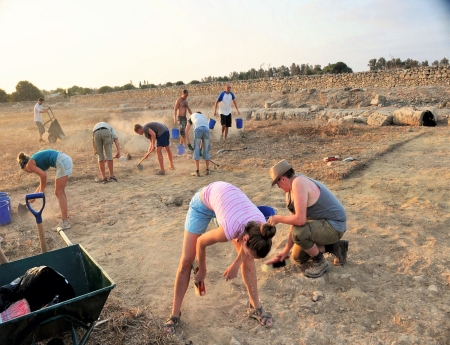
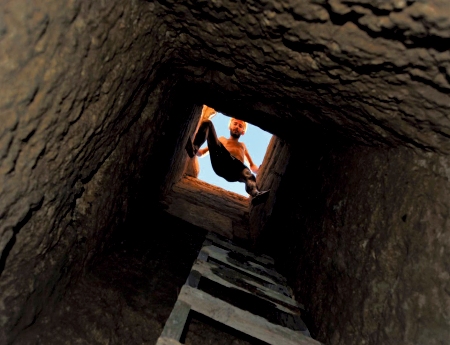 In one of the rooms of the Eastern Portico, a water well is found. The artifacts found inside allow's to shift the Agora's erection to the 2nd century BCE
In one of the rooms of the Eastern Portico, a water well is found. The artifacts found inside allow's to shift the Agora's erection to the 2nd century BCE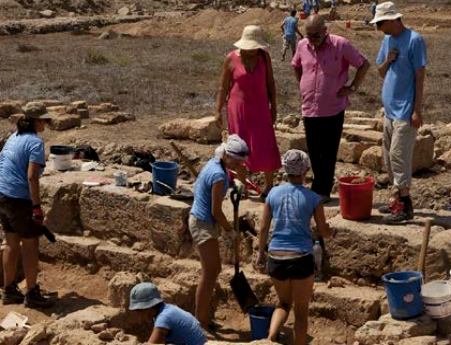 During the excavation, the Ambassador of the Republic of Poland in Nicosia, P. Dobrowolski, visits the site. The project receives the patronage of the Embassy. You can watch the TV report from the meeting >>
During the excavation, the Ambassador of the Republic of Poland in Nicosia, P. Dobrowolski, visits the site. The project receives the patronage of the Embassy. You can watch the TV report from the meeting >>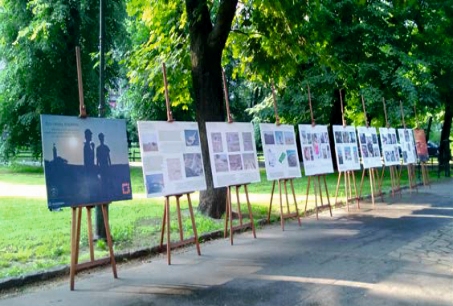 From May to June in Planty Park in Krakow, you could see the first open-air exhibition of PAP - "Under the care of Aphrodite. Cracow archaeologists discover the market of Paphos, the capital of the Greek-Roman Cyprus" (its description can be found>>
From May to June in Planty Park in Krakow, you could see the first open-air exhibition of PAP - "Under the care of Aphrodite. Cracow archaeologists discover the market of Paphos, the capital of the Greek-Roman Cyprus" (its description can be found>>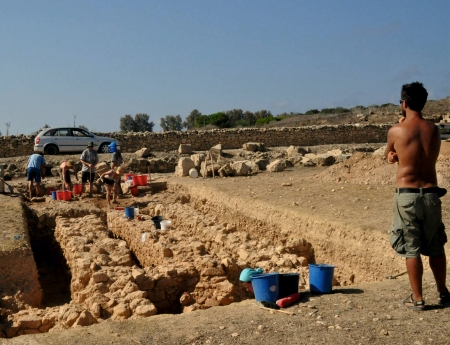 Another excavation season took place at the turn of August and September. The works were carried out mainly in Trench I and Trench III
Another excavation season took place at the turn of August and September. The works were carried out mainly in Trench I and Trench III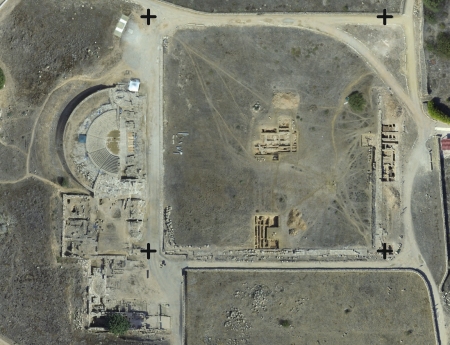
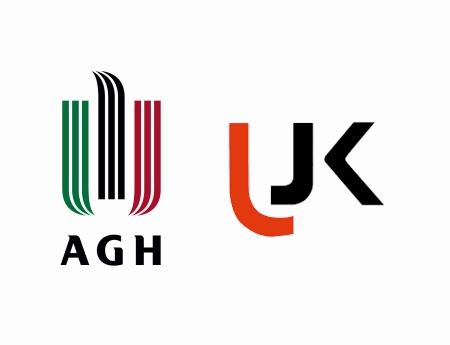 Beginning of cooperation with surveyors from the AGH University of Science and Technology in Kraków and geoarchaeologists from Jan Kochanowski University in Kielce.
Beginning of cooperation with surveyors from the AGH University of Science and Technology in Kraków and geoarchaeologists from Jan Kochanowski University in Kielce.
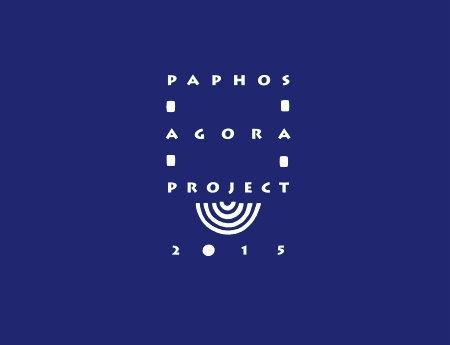 A new project logo designed by
A new project logo designed by 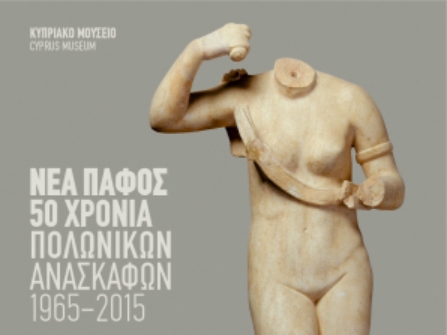
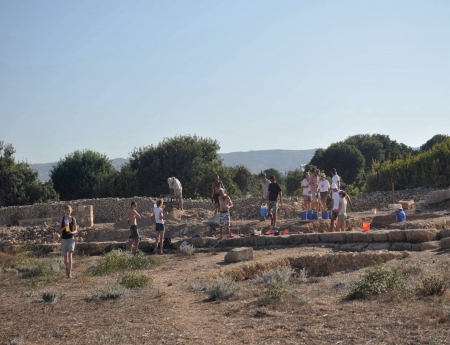
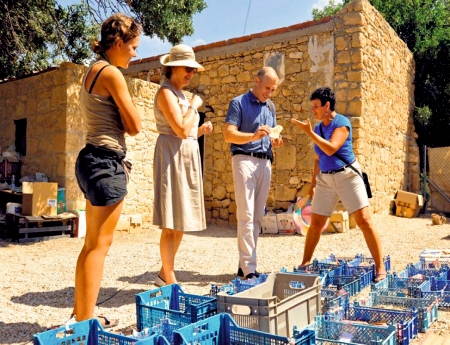 During the excavations, the site was visited by the Ambassador of the Republic of Poland in Nicosia, B. Tuge-Erecińska.
During the excavations, the site was visited by the Ambassador of the Republic of Poland in Nicosia, B. Tuge-Erecińska.
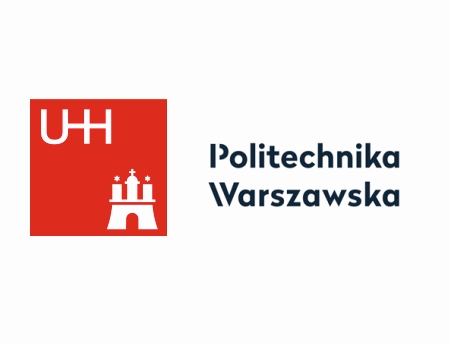
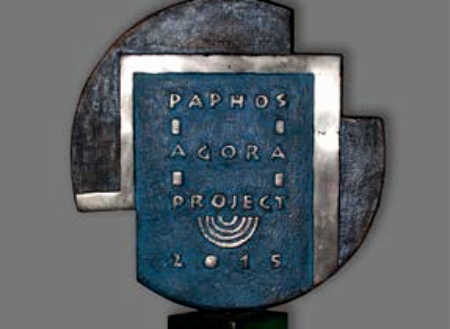 Prof. E. Papuci-Władyka receives the statuette of E. Wójcik-Konstantinovska on the occasion of its 5th anniversary.
Prof. E. Papuci-Władyka receives the statuette of E. Wójcik-Konstantinovska on the occasion of its 5th anniversary.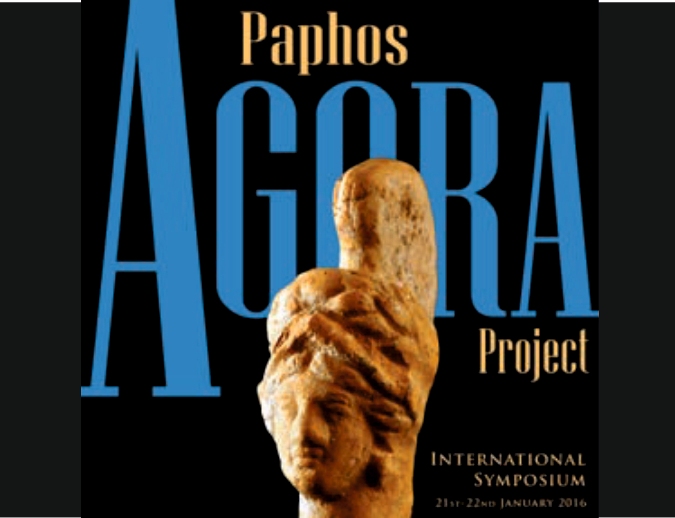
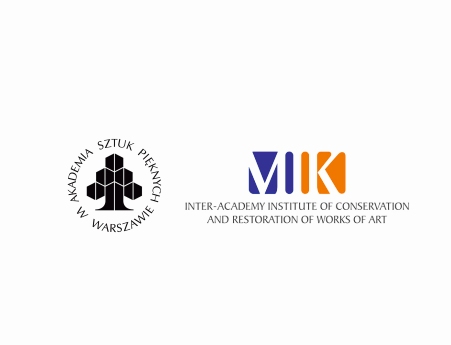 Beginning of cooperation with the Academy of Fine Arts in Warsaw and the Intercollegiate Institute of Conservation and Restoration of Works of Art.
Beginning of cooperation with the Academy of Fine Arts in Warsaw and the Intercollegiate Institute of Conservation and Restoration of Works of Art.
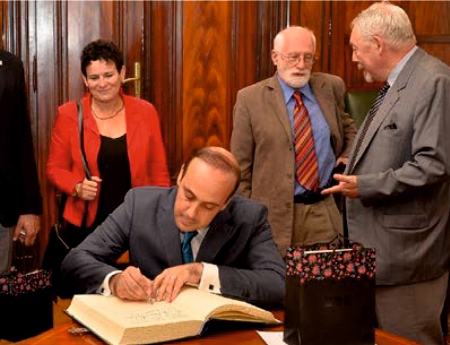 Official meeting and conversation between the Mayor of Paphos and the Mayor of Krakow.
Official meeting and conversation between the Mayor of Paphos and the Mayor of Krakow.
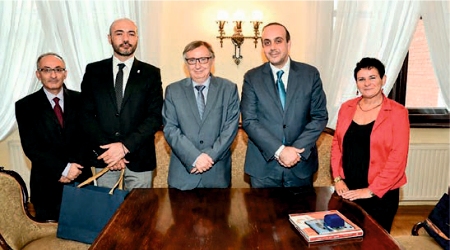 Official meeting and conversation between the Mayor of Paphos and the Rector of the Jagiellonian University.
Official meeting and conversation between the Mayor of Paphos and the Rector of the Jagiellonian University.
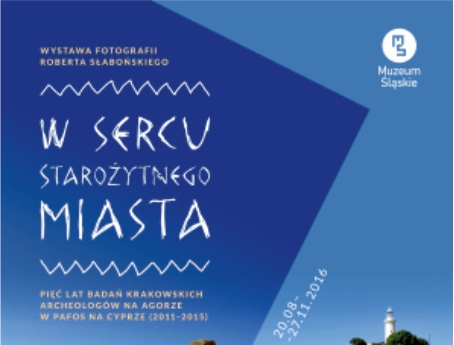 In August, the exhibition "In the heart of the ancient city" travels to the Silesian Museum in Katowice.
In August, the exhibition "In the heart of the ancient city" travels to the Silesian Museum in Katowice.
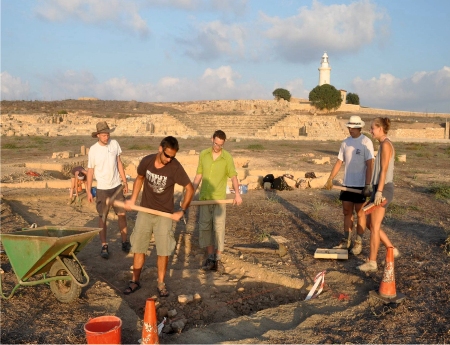
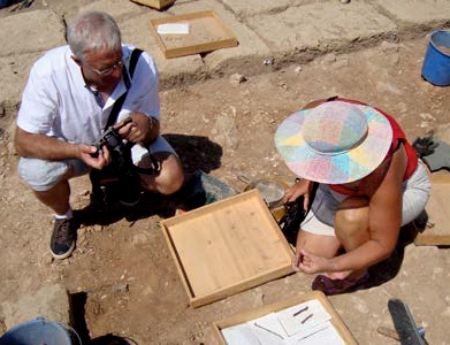 During the excavations, the site is visited by the Dean of the Faculty of History of the Jagiellonian University, Prof. Jan Święch.
During the excavations, the site is visited by the Dean of the Faculty of History of the Jagiellonian University, Prof. Jan Święch.
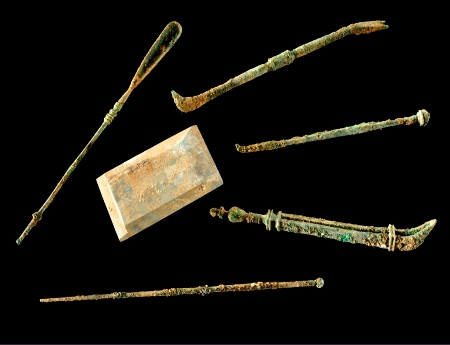
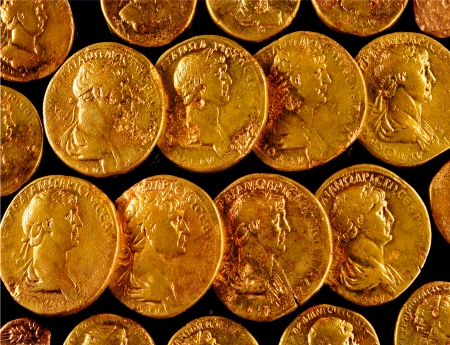 The treasure of coins found inside the so-called Surgery of the Paphos Surgeon allows to date the destruction and the end of use of the Eastern Portico of Agora to the 20s of the 2nd century AD.
The treasure of coins found inside the so-called Surgery of the Paphos Surgeon allows to date the destruction and the end of use of the Eastern Portico of Agora to the 20s of the 2nd century AD.
 In January, the "In Search of Lost Worlds" exhibition opens at the Old Factory Museum in Bielsko Biała, presenting the results of the Jagiellonian University's excavations in Agora in Paphos, Cyprus and in Sand Canyon in Colorado, USA.
In January, the "In Search of Lost Worlds" exhibition opens at the Old Factory Museum in Bielsko Biała, presenting the results of the Jagiellonian University's excavations in Agora in Paphos, Cyprus and in Sand Canyon in Colorado, USA.








 As part of the Pafos2017 celebration, prof. E. Papuci-Władyka presents the Rector of the Jagiellonian University, prof. W. Nowak a statuette made by E. Wójcik-Konstantinovska.
As part of the Pafos2017 celebration, prof. E. Papuci-Władyka presents the Rector of the Jagiellonian University, prof. W. Nowak a statuette made by E. Wójcik-Konstantinovska.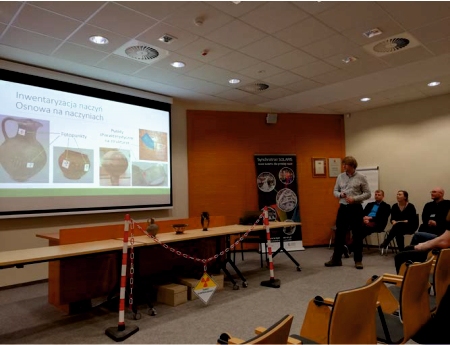 Presentation of the results of vessel documentation using FocusSphere and the Romer laser measuring arm in the SOLARIS building - the first Polish synchrotron built in Cracow.
Presentation of the results of vessel documentation using FocusSphere and the Romer laser measuring arm in the SOLARIS building - the first Polish synchrotron built in Cracow.
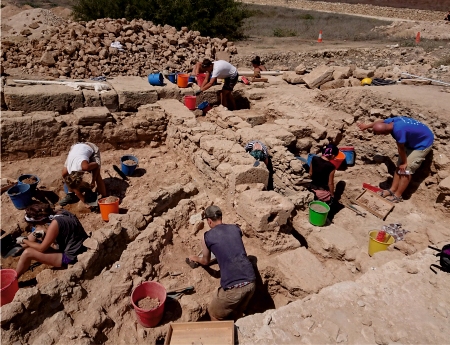
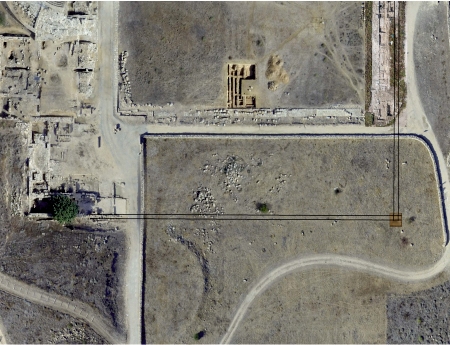 The results of geophysical investigations verified by excavations confirm that the Agora was surrounded by a double portico to the east and possibly a triple portico to the south, which meant it was much larger than originally thought.
The results of geophysical investigations verified by excavations confirm that the Agora was surrounded by a double portico to the east and possibly a triple portico to the south, which meant it was much larger than originally thought.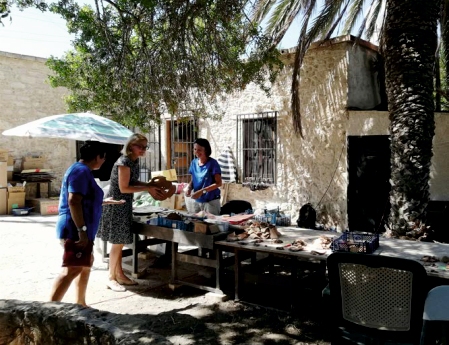 During the excavations, the site is visited by the Ambassador of the Republic of Poland I. Lichnerowicz-Augustyn.
During the excavations, the site is visited by the Ambassador of the Republic of Poland I. Lichnerowicz-Augustyn.
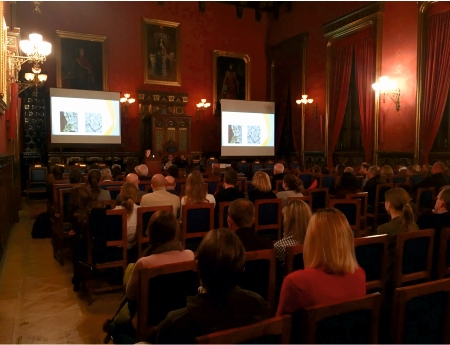 In November, in the representative Auditorium of the Jagiellonian University, Collegium Novum in Krakow, the premiere gala of the book Paphos - The Mystery of the City of Aphrodite, Archaeological heritage versus new technologies took place.
In November, in the representative Auditorium of the Jagiellonian University, Collegium Novum in Krakow, the premiere gala of the book Paphos - The Mystery of the City of Aphrodite, Archaeological heritage versus new technologies took place.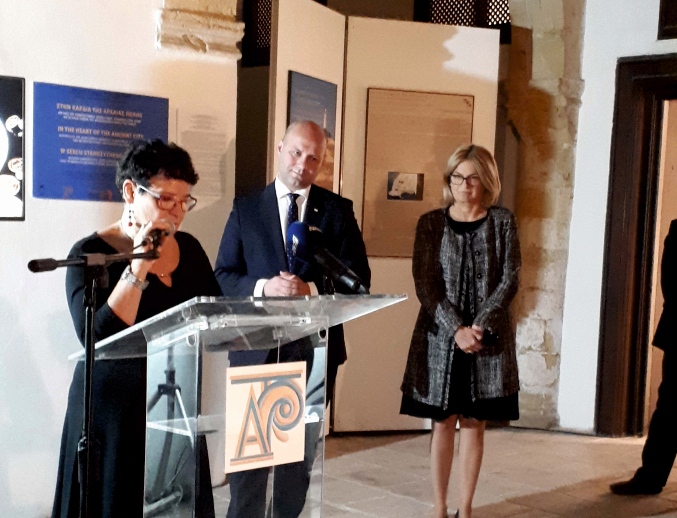 In November, the exhibition "In the heart of the ancient city" opens at the Ethnographical Museum in Nicosia (The Hadjigeorgakis Kornesios Mansion) under the auspices of the Minister of Transport, Communication and Works of the Republic of Cyprus, V. Anastassiadou. The event was honored by the Deputy Minister of Foreign Affairs of the Republic of Poland, S. Szynkowski vel Sęk, Ambassador of the Republic of Poland in Nicosia, I. Lichnerowicz-Augustyn and Director of the Department of Antiquities of the Republic of Cyprus, M. Solomidou-Ieronymidou.
In November, the exhibition "In the heart of the ancient city" opens at the Ethnographical Museum in Nicosia (The Hadjigeorgakis Kornesios Mansion) under the auspices of the Minister of Transport, Communication and Works of the Republic of Cyprus, V. Anastassiadou. The event was honored by the Deputy Minister of Foreign Affairs of the Republic of Poland, S. Szynkowski vel Sęk, Ambassador of the Republic of Poland in Nicosia, I. Lichnerowicz-Augustyn and Director of the Department of Antiquities of the Republic of Cyprus, M. Solomidou-Ieronymidou.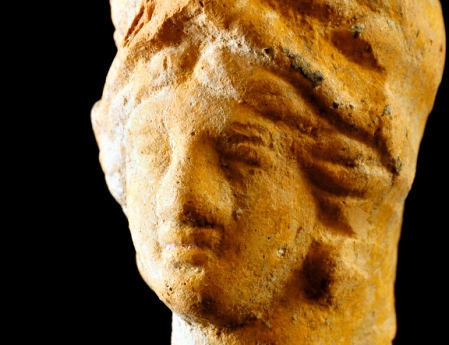
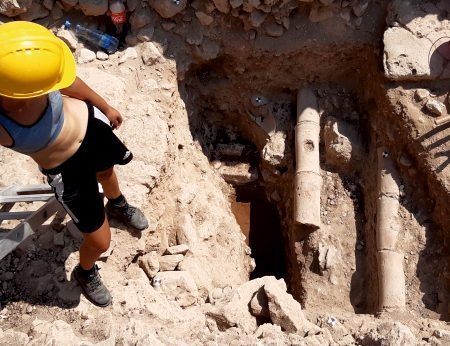 The 9th excavation season takes place from mid-August to the end of September. Works continued at the Trial Trench V, where a canal is found that marks the street parallel to the Eastern Portico. Two new Trial Trenches VII and VIII are also opened to capture the streets flanking the Northern Portico. Apart from the remains of the aforementioned road. A surprise at the Survey Trench VII was the discovery of a necropoleis with skeletal graves oriented on the north-south axis. Small works were also carried out on Trench II.
The 9th excavation season takes place from mid-August to the end of September. Works continued at the Trial Trench V, where a canal is found that marks the street parallel to the Eastern Portico. Two new Trial Trenches VII and VIII are also opened to capture the streets flanking the Northern Portico. Apart from the remains of the aforementioned road. A surprise at the Survey Trench VII was the discovery of a necropoleis with skeletal graves oriented on the north-south axis. Small works were also carried out on Trench II.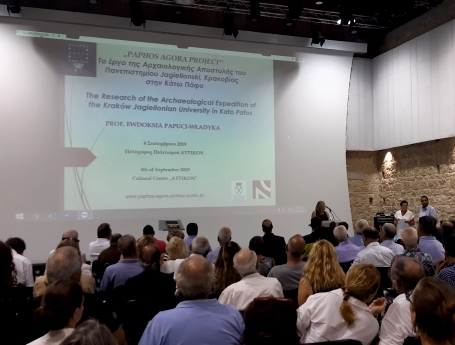 In September, the book Paphos - the mystery of the city of Aphrodite Archaeological heritage and new technologies - had its premiere in Cyprus. The ceremony was held at the "Attikon" Cultural Center in Paphos.
In September, the book Paphos - the mystery of the city of Aphrodite Archaeological heritage and new technologies - had its premiere in Cyprus. The ceremony was held at the "Attikon" Cultural Center in Paphos.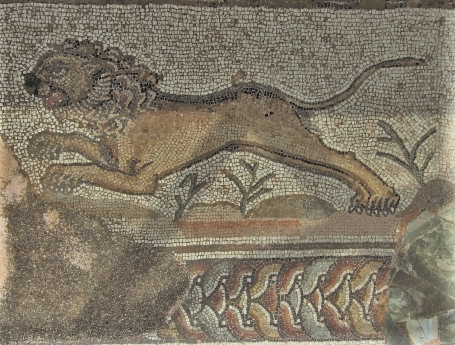
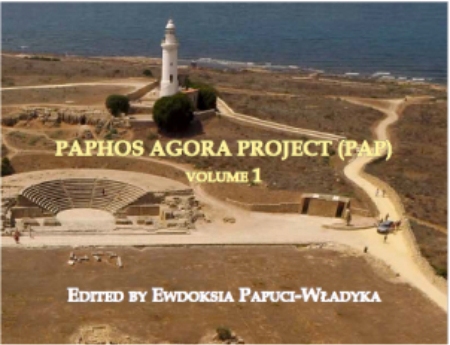 The first scientific monograph of the project on research in 2011-2015 is published in spring.
The first scientific monograph of the project on research in 2011-2015 is published in spring.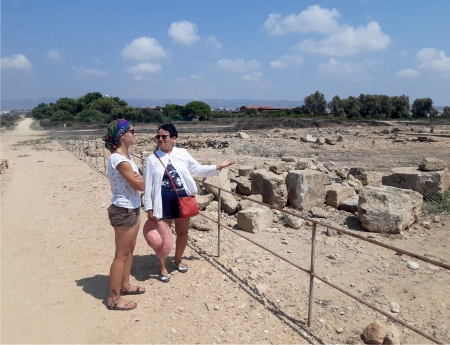
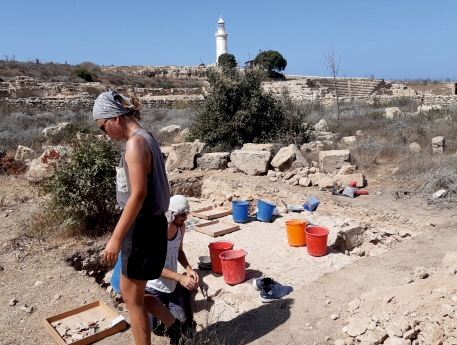 Despite the difficult conditions related to the COVID-19 pandemic, a small group of researchers from Krakow and Warsaw are starting research under the NCN OPUS 18 grant. This year, the excavation season took place in October. In Agora, work continued on the Sound Trench VI, and a new Trial Trench IX was opened on the outer line of the Southern Portico. Excavations have also started in the residential area of Maloutenie. Trial Trenches I and II were opened in the area of the western border of the plot (insula), on which the Villa of Theseus is located.
Despite the difficult conditions related to the COVID-19 pandemic, a small group of researchers from Krakow and Warsaw are starting research under the NCN OPUS 18 grant. This year, the excavation season took place in October. In Agora, work continued on the Sound Trench VI, and a new Trial Trench IX was opened on the outer line of the Southern Portico. Excavations have also started in the residential area of Maloutenie. Trial Trenches I and II were opened in the area of the western border of the plot (insula), on which the Villa of Theseus is located.